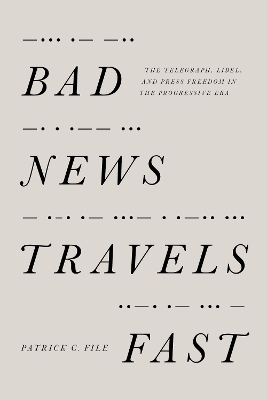
Bad News Travels Fast
The Telegraph, Libel, and Press Freedom in the Progressive Era
Seiten
2018
University of Massachusetts Press (Verlag)
978-1-62534-373-4 (ISBN)
University of Massachusetts Press (Verlag)
978-1-62534-373-4 (ISBN)
At the turn of the twentieth century, American journalists transmitted news across the country by telegraph. But what happened when these stories weren't true? In Bad News Travels Fast, Patrick C. File examines a series of libel cases by a handful of plaintiffs who sued newspapers across America for republishing false newswire reports.
At the turn of the twentieth century, American journalists transmitted news across the country by telegraph. But what happened when these stories weren't true? In Bad News Travels Fast, Patrick C. File examines a series of libel cases by a handful of plaintiffs - including socialites, businessmen, and Annie Oakley - who sued newspapers across the country for republishing false newswire reports. Through these cases, File demonstrates how law and technology intertwined to influence debates about reputation, privacy, and the acceptable limits of journalism.
This largely forgotten era in the development of American libel law provides crucial historical context for contemporary debates about the news media, public discourse, and the role of a free press. File argues that the legal thinking surrounding these cases laid the groundwork for the more friendly libel standards the press now enjoys and helped to establish today's regulations of press freedom amid the promise and peril of high-speed communication technology.
At the turn of the twentieth century, American journalists transmitted news across the country by telegraph. But what happened when these stories weren't true? In Bad News Travels Fast, Patrick C. File examines a series of libel cases by a handful of plaintiffs - including socialites, businessmen, and Annie Oakley - who sued newspapers across the country for republishing false newswire reports. Through these cases, File demonstrates how law and technology intertwined to influence debates about reputation, privacy, and the acceptable limits of journalism.
This largely forgotten era in the development of American libel law provides crucial historical context for contemporary debates about the news media, public discourse, and the role of a free press. File argues that the legal thinking surrounding these cases laid the groundwork for the more friendly libel standards the press now enjoys and helped to establish today's regulations of press freedom amid the promise and peril of high-speed communication technology.
Patrick C. File is an assistant professor at the Reynolds School of Journalism at the University of Nevada, Reno.
| Erscheinungsdatum | 02.02.2019 |
|---|---|
| Verlagsort | Massachusetts |
| Sprache | englisch |
| Maße | 152 x 229 mm |
| Gewicht | 362 g |
| Themenwelt | Geschichte ► Teilgebiete der Geschichte ► Militärgeschichte |
| Recht / Steuern ► Rechtsgeschichte | |
| Sozialwissenschaften ► Kommunikation / Medien ► Journalistik | |
| Sozialwissenschaften ► Kommunikation / Medien ► Medienwissenschaft | |
| ISBN-10 | 1-62534-373-6 / 1625343736 |
| ISBN-13 | 978-1-62534-373-4 / 9781625343734 |
| Zustand | Neuware |
| Haben Sie eine Frage zum Produkt? |
Mehr entdecken
aus dem Bereich
aus dem Bereich
neueste Manipulationstechniken als Waffengattung der NATO
Buch | Softcover (2023)
Westend (Verlag)
CHF 33,55
Deutschlands Schwäche in der Zeitenwende
Buch | Softcover (2023)
C.H.Beck (Verlag)
CHF 25,20


